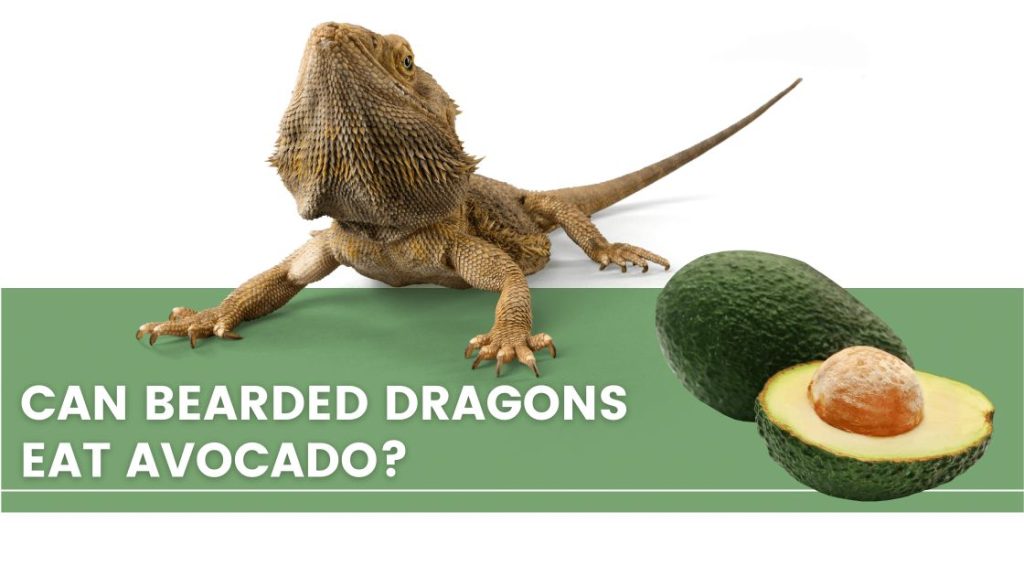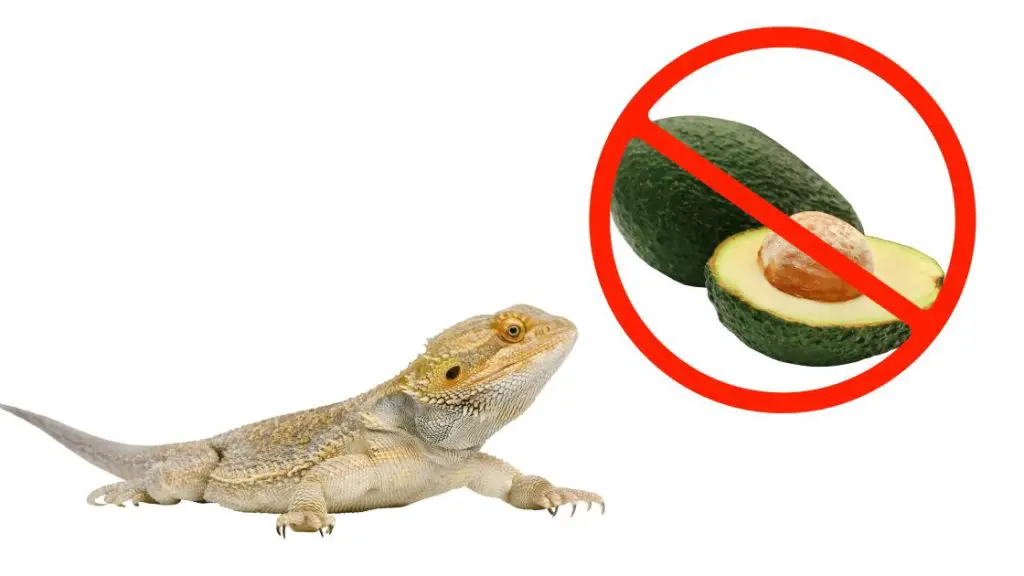
The No-Go Of Avocado
Can bearded dragons eat avocado? Absolutely not! There are a lot of foods that are safe for bearded dragons to eat and many that are dangerous and even toxic. Avocado is one of the fruits on the no-go list.
This article will explain why you should avoid feeding avocado to your bearded dragon and what to do if they ingest some.
The Risks Of Feeding Bearded Dragons Avocado
Persin: This extremely toxic substance is a fungicidal toxin poisonous to bearded dragons. Persin is found primarily in the skin and seeds of avocado. Just enough leaks into the fruit to make it toxic too. Persin can cause vomiting, diarrhea, respiratory failure, and even death.
Too much fat: Avocado is one of the fattiest fruits in existence as more than 75% of the avocado’s total calorie count comes from excess fat.
Bearded dragons can become obese when they eat fatty foods. Obesity can lead to tooth and gum decay, liver disease and, heart failure.
Oxalic Acids: Avocados have very high levels of oxalic acid. It is bad for bearded dragons because oxalic acid binds with calcium and prevents mineral absorption in the bloodstream.
Limit your dragon’s oxalate intake. An excess of oxalic acid can cause severe skeletal damage and metabolic bone disease. It happens when oxalic acid also binds with vitamins and minerals and inhibits your bearded dragon’s ability to absorb calcium and other minerals.
Inadequate calcium to phosphorus level: Bearded dragons require higher calcium than phosphorus levels. In avocados, the phosphorus level is higher than the calcium level. When the phosphorus level is higher, it inhibits calcium absorption in the body.
Choking Hazards: Bearded dragons do not chew. They just swallow their food. Avocados can be rigid, even when ripe. Unless the fruit is mashed, your beardie will choke on it and suffocate to death.
How Important Is Enough Calcium To Bearded Dragons?

Calcium is essential in your bearded dragon’s diet. Baby and adult bearded dragons need calcium to function at their peak. When your bearded dragon does not have enough calcium in its system, it will start taking calcium from its bones and leave your poor dragon in a weakened state.
The issues of too little calcium
What would the effects be if you did not give your bearded dragon calcium dusted food? Insufficient calcium will lead to calcium imbalance.
The following factors can cause calcium imbalance.
- Having too little calcium in your bearded dragon’s diet
- Having too much calcium in its diet
- No, or inadequate UVB inhibits calcium absorption
- Improper digestion due to no heat in the habitat.
Metabolic bone disease is the primary condition caused by calcium deficiency. It can lead to permanent bone damage, pain, discomfort, and death. As a bearded dragon owner, you must make yourself aware of the following symptoms to enable you to act fast.
- Limbs twitch or shake.
- Receding of the lower jaw
- Fracturing of bones
- Dragon behave weak and lethargic
- Dragons eat substrate to balance minerals but can become impacted
- Paralyzes of limbs
Read on to find out how you can help your beardie absorb more calcium.
Help Your Bearded Dragon Absorb Sufficient Calcium

We mentioned already that you should avoid high oxalate foods and, your bearded friend needs calcium supplements based on their age. But what about lighting? You are in trouble if you do not have a good UVB light inside your dragon’s terrarium.
Get a UVB light even before you adopt your baby beardie. The use of the light is to provide an area where your bearded dragon can bask and soak up vitamin D3.
The UVB rays keep your beardie’s temperature up and aid in the digestion of food. Vitamin D3 is required for your bearded dragon to be able to use calcium and minerals actively.
We advise you to provide high calcium insects like crickets and grasshoppers.
How To Prevent Kidney Stones
Avoiding high oxalate foods is vital to your lizard friend. Food too rich in oxalates can cause kidney stones. Here are some ideas to help bearded dragons remain healthy and prevent kidney stones.
- Make sure to provide fresh, clean water all the time. It will help your bearded dragon to stay healthy. It will also dissolve any crystals forming in your beardies’ colon.
- Offer calcium-rich foods and continue with calcium dusting.
What If Your Bearded Dragon Eats Avocado?
Bearded dragon owners must always research whether certain foods are good or unsafe before you feed your bearded dragon.
When your bearded dragon eats avocado by accident, it is crucial to act quickly and remain calm. Here are some steps you can take:
- Call your vet immediately for veterinary advice
- Look out for abnormal behavior, especially respiratory distress
- Try a warm bath to stimulate your bearded friend’s digestive system and work the avocado out.
- Use a syringe, give lots of water to your dragon to wash the poison out as quickly as possible
Conclusion
The bottom line is: Never feed avocados to your bearded dragon. Avocado is poisonous to bearded dragons and other animals due to its high oxalate levels and toxic substances, Cyanide and Persin. It can cause serious health issues and even be fatal.
There are plenty of other foods such as green beans and cauliflower that your bearded dragon can enjoy. Please make sure that you read about these vegetables before feeding them to your dragon friend. Remember, even the healthiest veggies also have risks.
Continue to read our main article “What do Bearded Dragons Eat?” for all the ins and outs on general diet questions, and get a further detailed breakdown of other popular foods in the articles below:
- Can Bearded Dragons eat tomatoes?
- Can Bearded Dragons eat oranges?
- Can Bearded Dragons eat parsley?
- Can Bearded Dragons eat blackberries?
- Can Bearded Dragons eat pumpkin?
- Can Bearded Dragons eat pineapple?
- Can Bearded Dragons eat cantaloupe?
- Can Bearded Dragons eat green beans?
- Can Bearded Dragons eat cherries?
- Can Bearded Dragons eat asparagus?
- Can Bearded Dragons eat mango?
- Can Bearded Dragons eat cauliflower?
- Can Bearded Dragons eat brussel-sprouts?
- Can Bearded Dragons eat collard-greens?
- Can Bearded Dragons eat wax-worms?
- Can Bearded Dragons eat dandelions?
- Can Bearded Dragons eat nightcrawlers?
- Can Bearded Dragons eat earthworms?
- Can Bearded Dragons eat eggs?
- Can Bearded Dragons eat cicadas?
- Can Bearded Dragons eat basil?
- Can Bearded Dragons eat peaches?
- Can Bearded Dragons eat grasshoppers?
- Can Bearded Dragons eat sweet potato?
- Can Bearded Dragons eat hornworms?

